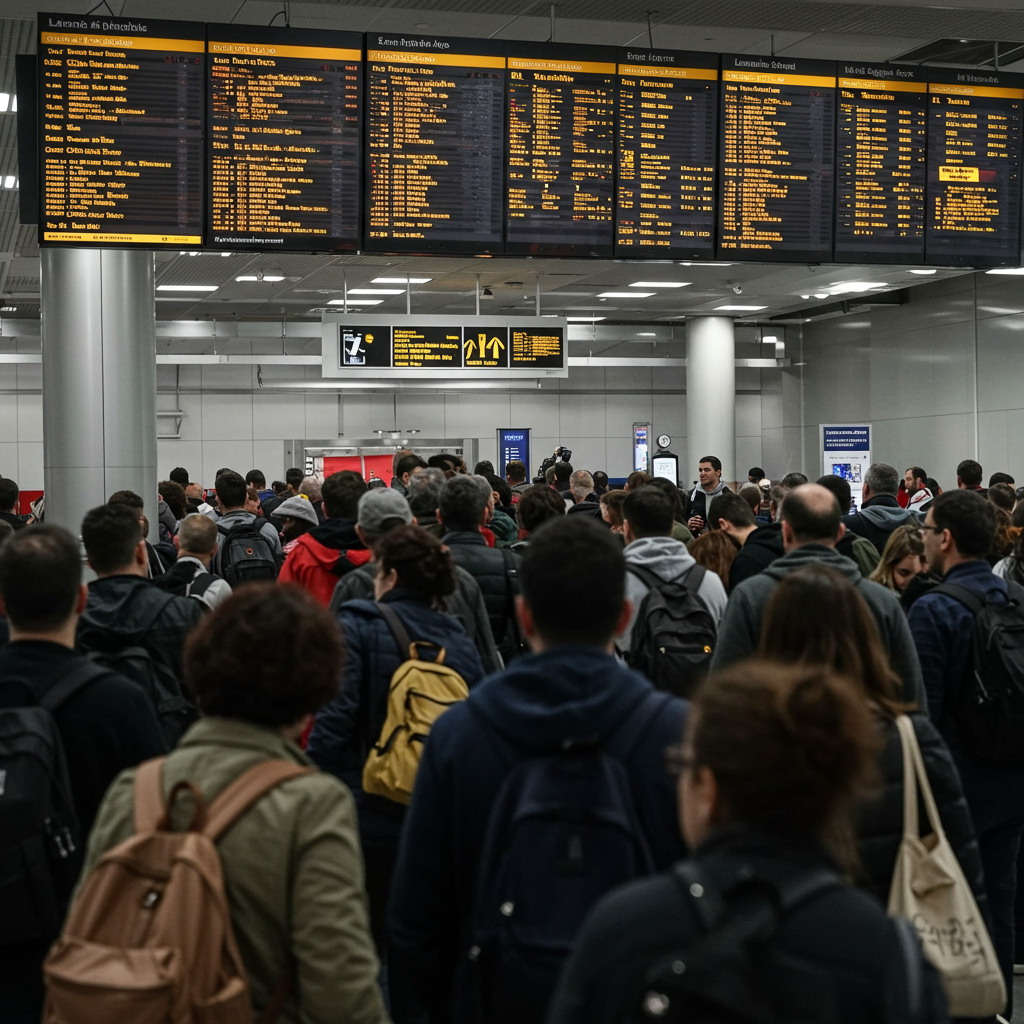Tens of thousands of travelers are facing significant disruption across France as a widespread strike by french air traffic controllers severely impacts air travel. Coinciding with the start of the peak summer holiday season and French school closures, the industrial action has triggered mass flight cancellations and lengthy delays at airports nationwide.
This critical situation intensified on Friday, July 4, 2025, after initial disruptions began the previous day. Authorities requested airlines drastically cut flight schedules to manage reduced staffing levels, leaving passengers scrambling to rearrange plans during one of the busiest travel periods of the year.
Widespread Cancellations Cripple Air Travel
The impact of the French air traffic strike is immediate and substantial. France’s national civil aviation authority (DGAC) implemented mandatory capacity reductions across key airports. At all Paris airports, including the major hubs Charles de Gaulle, Orly, and Beauvais, airlines were directed to cancel 40% of their planned flights for Friday.
Disruptions weren’t confined to the capital. Nice airport saw half of its flights grounded, while airports in cities like Marseille, Lyon, Montpellier, Ajaccio, Bastia, Calvi, and Figari experienced 30% cancellations. These figures followed similar reductions mandated on Thursday. Despite these preemptive measures, the DGAC issued a stark warning that “disruptions and long delays are to be expected at all French airports,” indicating the cancellations alone were insufficient to prevent chaos.
Major carriers confirmed the severe impact. Ryanair reported canceling over 400 flights on Thursday and Friday combined, affecting approximately 70,000 passengers. Easyjet added to the figures, canceling 274 flights. Airlines for Europe (A4E) estimated the total number of canceled flights across the two days surpassed 1,500, impacting over 300,000 passengers.
Crucially, the strike doesn’t just affect flights departing from or arriving in France. It also disrupts ‘overflights’ – flights simply passing through French airspace en route to other destinations. This forces airlines to reroute aircraft, leading to extended flight times and delays across various European and North African corridors, impacting journeys between the UK, Spain, Greece, Ireland, Belgium, Portugal, and Morocco, among others.
Airports Hit Hardest by the Strike
Paris Airports (CDG, Orly, Beauvais): 40% of flights canceled
Nice Airport: 50% of flights canceled
- Marseille, Lyon, Montpellier, Ajaccio, Bastia, Calvi, Figari Airports: 30% of flights canceled
- abcnews.go.com
- apnews.com
- www.euronews.com
Why Air Traffic Controllers Are Striking
The industrial action is being led primarily by the UNSA-ICNA union, the second-largest union representing French air traffic controllers, with support from the USAC-CGT, the third-largest. The striking unions cite several key grievances driving the walkout:
They argue there is an insufficient number of air traffic control personnel to adequately manage the surging demand for air travel, particularly during peak seasons. Inflation is also a major concern, with controllers feeling that their salaries are not keeping pace with rising living costs.
Furthermore, the unions are protesting against new reform measures proposed by the DGAC. These reforms aim to implement tighter monitoring of controllers’ work, a move reportedly prompted by a near-collision incident at Bordeaux airport. The UNSA-ICNA union also cited “toxic” and “authoritarian” management as reasons for the strike. Notably, the largest ATC union, SNCTA, which represents 60% of workers, did not participate in this particular strike.
Government Displeasure and Airline Calls for Reform
The timing of the strike, coinciding directly with the start of France’s busy summer holiday period when schools close and millions travel, has drawn sharp criticism from the French government. Transport Minister Philippe Tabarot publicly stated that the unions’ demands and their decision to strike at this critical juncture were “unacceptable.”
Airlines, bearing the brunt of the cancellations and passenger frustration, echoed calls for stability. Ryanair specifically urged the European Union to reform air traffic rules. They highlighted that their overflights are disproportionately affected by French strikes compared to other nations, suggesting a need for EU-level action to mitigate the impact of national industrial disputes on pan-European air traffic flow.
For travelers caught in the disruption, the experience is frustrating. Mariano Mignola, an Italian traveler, described the difficulty of finding alternative transport or accommodation at short notice during the packed holiday season after his flight from Paris was canceled the night before departure. Parisian passenger Patrick Haus, whose flight to Nice was canceled, expressed a degree of understanding for the controllers’ position, stating that “people don’t strike for fun,” acknowledging that such actions usually stem from serious issues.
Navigating Travel During the Strike Period
Experiencing a flight cancellation or delay due to an air traffic controller strike in France is highly stressful, especially during peak season. Airlines are the primary point of contact for affected passengers. They are responsible for informing travelers of changes and offering alternative arrangements, such as rebooking on the next available flight or providing refunds. Passengers may also be entitled to compensation or assistance (like accommodation and meals) under EU regulations, depending on the length of the delay and the reason (though strikes can sometimes be classified as ‘extraordinary circumstances’).
It is crucial for anyone flying to, from, or over France during this period to actively monitor their flight status directly with their airline well before heading to the airport. Airlines are processing large volumes of changes, and proactive checking can save considerable time and frustration.
Understanding the Broader Context
This industrial action is part of an ongoing pattern of disputes between French air traffic controllers and the DGAC. While an “Olympic truce” temporarily paused strikes in the lead-up to and during the 2024 Paris Olympics, confrontations over staffing, pay, and working conditions have been recurrent.
A previous walkout in May 2024, for instance, grounded approximately 70% of flights. Data from Eurocontrol highlighted the significant impact of French ATC strikes in 2023, causing tens of thousands of cancellations and delays that affected over 10 million passengers between March and April alone.
In response to the frequent disruptions, a new French law has been introduced requiring striking air traffic controllers to declare their intention to strike at least 48 hours in advance. This aims to provide the DGAC with sufficient notice to build revised flight schedules based on expected staffing levels, a system already in place for national railway and Paris public transport workers. However, despite this measure, significant disruption persists when strikes occur.
The current strike underscores the fragility of air travel during peak demand and the critical role of air traffic control personnel. Resolving these disputes is essential for ensuring smooth and reliable air travel, particularly as summer holidays get into full swing across Europe.
Frequently Asked Questions
Why are French air traffic controllers striking right now?
French air traffic controllers have launched a strike primarily due to grievances related to staffing levels, pay, and working conditions. Unions argue there are not enough controllers to manage the high volume of air traffic, and that salaries are not keeping pace with inflation. They are also protesting against new measures aimed at increasing monitoring of their work, which they oppose. The timing coincides with the busy summer holiday season, amplifying the impact.
What should you do if your flight is affected by the French ATC strike?
If your flight is scheduled to fly to, from, or over France during the strike, immediately check its status directly with your airline. Airlines are contacting affected passengers and are required to offer options like rebooking on an alternative flight or providing a refund. Be aware of your passenger rights under EU regulations, which may include assistance with accommodation and meals if you face significant delays or cancellations.
Which French airports are most impacted by the strike?
The strike mandates significant flight cancellations at major airports across France. On Friday, July 4, 2025, Paris airports (Charles de Gaulle, Orly, Beauvais) were asked to cancel 40% of flights. Nice airport saw the highest percentage reduction at 50%, while airports in Marseille, Lyon, and several others in the south of France (Montpellier, Ajaccio, Bastia, Calvi, Figari) were directed to cancel 30% of flights. The DGAC warns that delays are expected at all French airports.
—
The ongoing French air traffic strike poses a major challenge for summer travelers. As unions and authorities remain in dispute, the immediate future of air travel across and within France faces continued uncertainty. Passengers must stay informed and prepare for potential disruption.




